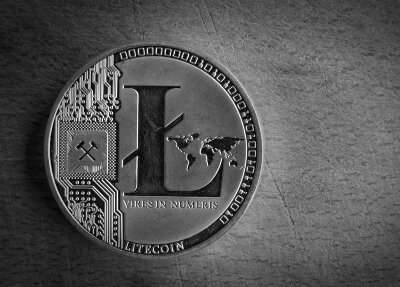Cryptocurrency for Dummies Who Aren't Dummies
You have probably heard about cryptocurrency, but if you're like me, you may not have fully understood what cryptocurrency is all about or how it really works. If that describes your experience with cryptocurrency, then you're in the right place. I would have personally greatly benefited from a cryptocurrency for dummies guide, but unfortunately there wasn't one out there. So now that I have gained some knowledge in this elusive topic, I am going to share the basics about cryptocurrency with you here. Just think of this as a cryptocurrency for dummies -- who aren't dummies.
The Basics of Cryptocurrency
What even is cryptocurrency? The word seems to be everywhere in the news, but what does it mean? To explain what cryptocurrency is, I will introduce cryptocurrency for dummies by first introducing some of the important technology and then giving a brief history of cryptocurrency. After that, I will provide a list of the most common cryptocurrencies out there.
History of Cryptocurrency
Cryptocurrency's technical foundation was built in the early 1980s. It all began with, as you may have guessed, cryptography. David Chaum, an American cryptographer, created the "blinding" algorithm that is essential for what is modern web-based encryption, which allows for electronic currency transfers referred to as "blinded money". Less than a decade later, David decided to move to the Netherlands in the pursuit of commercializing this algorithm and the idea of "blinded money". He did just that with a company called DigiCash. While DigiCash only survived until the late 1990s, it was successful enough when it first began to catch Microsoft's eye, who had wanted to build a lucrative partnership with DigiCash.
Multiple people tried to roll out cryptocurrencies after that, including Wei Dai, who had the idea of b-money but was not successful in actually rolling it out, and Nick Szabo, who was successful in actually releasing a cryptocurrency called Bit Gold -- unfortunately, a short-term success, which has not lasted as a viable cryptocurrency. Even the Russian tried to create a cryptocurrency, called WebMoney. However, in the late 1990s and 2000s, it was e-gold that was the cryptocurrency of choice in the US. E-gold lasted a while, but it ended up ceasing operations in 2009.
The most popular cryptocurrency, Bitcoin, was discussed in a 2008 white paper, which was published by Satoshi Nakamoto, and rolled out in 2009. The rest is history really. Up to now, Bitcoin is still the most popular cryptocurrency on the market.
Important Terminology
There is a lot of cryptocurrency terminology out there, but here is a list of the most important terminology, of course with definitions included. Instead of putting these words in alphabetical order, I am going to put them in order of relevance, so that I can more easily bring you into understanding of the cryptocurrency world.
First, I want to provide a few key terms that describe different types of currency:
Cryptocurrency
This is what we're here to talk about. Cryptocurrency is a digital, or virtual, currency, in contrast to the physical currency we are used to. Cryptocurrency is called cryptocurrency because of the way it is created, which is secured by cryptography.
Altcoin
Altcoin is not a specific type of cryptocurrency, rather it is actually basically a synonym for cryptocurrency. It is the conjunction of "alternative" and "coin".
Fiat Currency
Fiat currency is the physical currency we are used to. It is easiest to understand when you think of currencies such as the US Dollar or the Euro. Fiat money is government-issued currency. This means that it derives its power from the government that issued it, rather than needing to be backed by a physical commodity, such as silver or gold.
Now, I would like to provide a few key terms that describe how cryptocurrency is created and collected:
Mining: Cryptocurrency is created via a process called mining
Miner: A miner is the person who does the mining for cryptocurrency
Block: A block is what contains the transaction data of what will turn into cryptocurrency. Each block can only be unlocked by solving a complex computational math problem or puzzle, which can only be solved by high-powered computers. The resulting block is referred to as a block reward or a miner's reward
Blockchain: A blockchain is a collection of blocks, essentially making it a database of all of this collected transaction data
Cryptography: Cryptography is a way to protect and secure both information and communications through the use of codes
Finally, here are some miscellaneous words related to cryptocurrency, which you may have heard before but may have a slightly different meaning when referring to cryptocurrency:
Key: As mentioned above, cryptocurrency is secured via cryptography. Keys in this sense are a cryptographic code, which can come in the form of either a public key or a private key. As the name suggests, public keys are accessible to everyone. They are actually easy to look up via a publicly accessible directory. Public keys allow people to send you cryptocurrencies, as well as allow you to receive cryptocurrencies from others. Also as the name suggests, private keys are private and not readily accessible to just anyone. The private key is only known by the owner and is what allows you to pay out cryptocurrencies.
Wallet: While I am sure you know what a wallet is, wallets are visualized a bit differently in the digital world. The public key mentioned above is like a virtual wallet, since it is what allows you to collect and hold your cryptocurrency, essentially taking over the role of a virtual wallet.
Cryptocurrency Currencies
As mentioned before, Bitcoin is the most common cryptocurrency, but it isn't the only cryptocurrency out there. Here is a list of the top ten cryptocurrencies available today, along with their associated symbol (in parentheses):
There are more cryptocurrencies available, but these are the cryptocurrencies currently ranked in the top 10. Here you can see the value of some of them today:
Should you invest in Cryptocurrency?
You may be reading this because you are personally interested in investing in cryptocurrency, but maybe you aren't sure if this is really the right option for you. Regardless of whether or not you decide to invest, it is a good idea to look at financial management.
Financial Management
No matter how much, or how little, money you have, it is a good idea to dive into money management. While most people may think that money management is only something for rich people, who have more money and assets, that is simply not the case. It is true that rich people with a lot of money and assets need their own money management, but money management is also just as much for those of us without as much money or assets. Here are just a few examples of who money management could help:
the single mother who needs to figure out how to put food on the table for her children
the recent graduate who is trying to figure out the balance between affording life on their own and paying off their student loans
the couple who is financially stable but is not sure how they will afford to send their child to college
the individual who wants to make their dreams of owning a small business come true, despite the fact that it would mean leaving a stable career for an uncertain future
the family who is financially comfortable but does not know how to afford their next family trip
YOU
What is your story? Do you have any financial goals that you do not know how to reach? If so, you're not alone. We all have goals in life, and financial management could help you reach your goals. However, you don't have to do it alone. There are a lot of financial management tools, many of which are free, out there. There are even finance apps for reaching your financial goals.
If your financial goals include developing money management skills, then you should think about opening a savings account. If this sound interesting to you, check out our suggestions down below:
Investing in Cryptocurrency
Depending on your own financial goals, investing in cryptocurrency could help you reach your financial goals.
Of course, before you invest in anything, it is important to learn how to invest and decide what kind of investor you will be. Do you typically like to DIY and prefer to be hands-on? If so, it could be easier and cheaper for you to maintain your own portfolio. If you are new at this, though, and need a little help, then it could make sense for you to consider robo-investing or working with an online financial advisor.
Whatever you end up deciding, make sure you invest responsibly. It is probably not the best idea to invest all of your money at once, especially if you have little to no experience in investing. Instead of investing all of your money at once, consider spacing out your investments over time and developing a strategy. While it is possible to win it big while making random investments, strategizing could help you earn more in the end.
Which Cryptocurrency You Should Invest In
If you decide to invest in cryptocurrency, make sure you do your research. Not every cryptocurrency is created equal. Make sure to check out the best cryptocurrencies to invest in 2020. Unsurprisingly, there are several names on the list of best cryptocurrencies to invest in 2020 that were also on our list of top 10 cryptocurrencies. Also unsurprisingly, Bitcoin is #1 on the list of best cryptocurrencies to invest in 2020. It should not be underestimated that Bitcoin is the most-accepted cryptocurrency out there, and it seems to be here to stay, at least for a good amount of time.
This may also have to do with the fact that it has a fixed supply. Unlike fiat currencies, which can have more of the currency printed if the government deems it necessary to do so, there is only a certain amount of Bitcoin out there. At the current rate of Bitcoin mining, it seems that Bitcoin will max out at 21 million. That means that after 20 million Bitcoin is mined, that's it. This makes Bitcoin a rare commodity, which indicates that the demand of Bitcoin will just continue to increase over time.
Predictions for the Future
You can never say for sure what will happen in the future, especially in economics, but cryptocurrency seems to be around for the long haul. That being said, there seems to be a consensus about one thing: cryptocurrency is redefining the future of finance. Regarding the future of finance, I will focus on one popular debate: the deflation debate. Or what I like to call the new Deflategate.
Bitcoin and the Deflation Debate
There have been a lot of arguments from economists that Bitcoin in particular may be at risk of deflation. However, there are also many economists arguing that Bitcoin could not be at risk of deflation. Those who are worried about deflation point at issues such as hyperdeflation and the deflationary spiral.
Hyperdeflation occurs when deflation happens quickly and in an extreme measure. This is particularly characterized by a large increase in the purchasing power of a currency in a short period of time. In a sense, this is what happened with Bitcoin. Bitcoin has had a large increase in purchasing power over a short period of time. However, the associated deflationary spiral that some economists worry about does not seem likely, since a deflationary spiral is characterized by a decrease in both demand and price and, as we mentioned before, the fixed supply of Bitcoin indicates that it will not experience a decrease in demand.
That is not to say that Bitcoin is not affected by deflation and vice versa. On one hand, Bitcoin is not a fiat currency and thus is not affected by the economic market at large, at least not in the same way that the US Dollar or Euro would be affected. On the other hand, it would be unwise to assume that the current COVID-19 pandemic and its effect on the economic market would not possibly impact Bitcoin. However, it is impacting Bitcoin in a way you may not have expected. The coronavirus pandemic has led to issues of deflation, which has in turn led to a decrease in the trust of fiat currency. This decrease in the trust of fiat currency has made some turn to alternative currencies, such as cryptocurrency. In this way, deflation may actually be good for Bitcoin.
The Coming Monetary Renegotiation
As I mentioned before, many people believe that cryptocurrency will redefine the future of finance. Many things have pointed to Bitcoin specifically playing a big role in this coming monetary renegotiation. Some examples of how Bitcoin may be playing a role in the coming monetary renegotiation include:
Deflation: As I mentioned regarding Bitcoin and the deflation debate, trust has increased in Altcoin and Bitcoin since the coronavirus pandemic. If this continues and more people turn to cryptocurrencies instead of fiat currencies, then Bitcoin will play a very large role in the coming monetary renegotiation.
Famous people endorsing Bitcoin: There have been many famous people who have endorsed Bitcoin recently, including MicroStrategy CEO Michael Saylor, who has invested $425 million of MicroStrategy's funds into Bitcoin and has said that "Bitcoin is less risky than holding gold, famous investor Warren Buffet, who has been said to be "panic-buying Bitcoin at $50,000", and hedge fund manager Paul Tudor, who holds almost 2% of his own assets in Bitcoin.
However, it isn't just Bitcoin that will play a role in this coming monetary renegotiation. Gold may also play a role. Warren Buffet may be panic-buying Bitcoin in large quantities, but he has also recently changed his mind regarding his dislike of gold. This also has to do with the deflation reasoning; a decrease in the trust of fiat currencies has led to an increase in the trust of alternative currencies, including gold.
Other cryptocurrencies may also play a key role in the coming monetary renegotiation. Specifically, it has predicted that China's cryptocurrency, the Digital Currency Electronic Payment (DCEP), will play a large role in the economy in the future. Chandler Guo, a pioneer in cryptocurrency, has predicted that "one day everyone in the world will be using DCEP...DCEP will be successful because there are a lot of Chinese people living outside of China - there are 39 million Chinese living outside of the country" and "if they have a connection with China they will use the DCEP. They can make DCEP become an international currency."
The coming monetary renegotiation is underway, and there are many key players in cryptocurrency who are taking part, two of which being Bitcoin and DCEP. Only time will tell what will happen.
Build Your Wealth.
The Wealthry Store is Here to Help.
Conclusion
I hope that now that you have read my cryptocurrency for dummies, you don't feel like a dummy anymore. Now you should have a basic understanding of what cryptocurrency is, what it might mean for you and your life, as well as gained some talking points -- such as what investing in cryptocurrency is like and what the future of cryptocurrency looks like, which can show your friends and family that you know what you're talking about when it comes to cryptocurrency!
Don't hesitate to share this cryptocurrency for dummies with your friends and family though. No one wants to feel like a dummy, and this cryptocurrency for dummies can really give even the most economically-lacking person a basic understanding of cryptocurrency.













